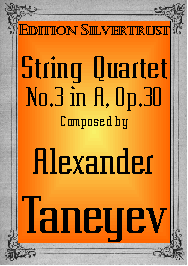Presents
Alexander Taneyev
String Quartet No.3 in A Major, Op.30
 Alexander
Taneyev's String Quartet No.3, his last, was finished in 1900. It, along with
the first two, comprise an interesting and unjustly ignored set of late-romantic
Russian string quartets in the tradition of Rimsky-Korsakov and his students
such as Borodin and Glazunov.
Alexander
Taneyev's String Quartet No.3, his last, was finished in 1900. It, along with
the first two, comprise an interesting and unjustly ignored set of late-romantic
Russian string quartets in the tradition of Rimsky-Korsakov and his students
such as Borodin and Glazunov.
Those who have heard have heard the name Taneyev invariably associate it with his distant cousin Sergei Taneyev (1856-1915), sometimes known as the “Russian Brahms”. Alexander Taneyev (1850-1918) inherited an enthusiasm for music from his parents, but as a member of the Russian upper class, was dissuaded from pursuing a career as a professional musician. He eventually succeeding his father as Director of the Imperial Chancellery. However, Taneyev also pursued musical studies both in Germany and later in Petersburg where he became a student of Rimsky Korsakov. His situation was in some ways rather like that of Alexander Borodin, a Professor of Chemistry. Both were fine composers whose main occupation was not that of musician. However, whereas Borodin might easily slip away from his test tubes in the laboratory to a nearby room to note down some theme which suddenly occurred to him, Taneyev, as a bureaucrat, was unable to just get up and leave his desk. It was rumored, nonetheless, that he kept a score that he was working on hidden beneath official documents so that he might pen a few notes between appointments. Judging from his output——two operas, three symphonies, several pieces for orchestra, numerous choral works, and a considerable amount of chamber music——his appointment schedule could not have been too heavy.
The quartet begins with a romantic Allegro commodo, whose main theme is rather sweet. The treatment of the material is gentle and leisurely. A bright, clever Scherzo, allegro molto--a virtual moto perpetuo, comes next. The second theme is darker and more relaxed. The main theme to the slow movement, Larghetto, in mood resembles that of the first movement, though it is somewhat more pensive. The finale, Allegro molto, has for its main theme a subject which is march-like. Taneyev introduces the lovely second theme without a development which he saves for later.
Long out of print, here is a quartet sure to please fans of Russian romantic music.
Parts: $24.95